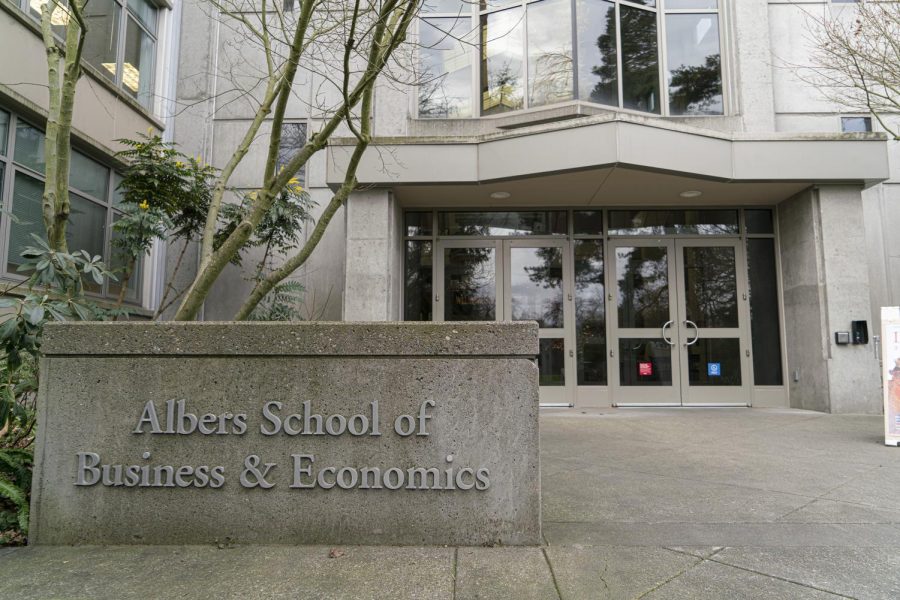Examining The Intersection Between Business and Morality
Entrance to the Albers School of Business and Economics.
While educating students for the corporate world, creating ethically-engaged leaders is one of the responsibilities of a Jesuit business school, especially at an institution that prides itself on its dedication to social justice and personal responsibility.
Jessica Imanaka, associate professor in the department of management and the department of philosophy, reflected on differences she’s observed across colleges that may contribute to misunderstandings regarding the Albers School of Business and Economics and its teachings.
“I am very interested in ideological differences that exist on campus, where there is a certain longstanding rift between various factions of the university. There is definitely more anti-capitalist theory that is taught in the College of Arts and Sciences than would be taught in the Albers school,” Imanaka said.
For College of Arts and Sciences students who lean far to the left of center, a general suspicion toward Albers occasionally makes itself known in the campus culture, as reflected in the online memeification of the ‘Albers bro’ or business major stereotype.
Giancarlo Agogliati, a third-year finance major, noticed a disparity between Albers and other schools on campus, especially in regards to how professors approach ethics education.
“In a statistics class, you might not talk about it just because we are talking about how to interpret data. But, in a managerial class, where you are determining whether people are being fired or not, you’re always taught to look at the whole picture,” Agogliati said.
Imanaka teaches business ethics courses, which is a required course for every Albers student, and sees those courses as a space for students to reflect on diverse messages across the university and within Albers.
“Even within the Albers school, depending on the discipline, the class and who’s teaching it, you will get different stories, and that’s good. I see the purpose of my course as giving students the chance to critically reflect on the different messages they have been receiving and to come to their own conclusions,” Imanaka said.
Agogliati echoed the sentiments expressed by Imanaka and emphasized attention to ethics education as part of the curriculum but stated how much a professor chooses to focus on ethical business leadership is dependent upon the course and professor.
“I would say that [ethics are] not really touched upon in our regular business classes very much. We’re not taught how to screw people over, but we are just taught the hard skills,” Agogliati said.
Jeffery Smith, professor and chair of professional ethics, believes technical education can be applied within an ethical framework, despite his expression that critics often believe otherwise.
“Getting a business degree, you’re learning about finance. You’re learning about managing people. You’re learning about the economic system and the macroeconomy in which business operates. It seems like all of that is still valuable to learn about even if you are looking for an organization where you align with the mission and the values. A business education can still prepare you for that,” Smith said.
The idea that business skills can be woven into an ethical framework is not exclusive to Smith. Imanaka expressed her belief that the younger generation, in particular, is ripe with an ambition to change existing structures. She believes that students can utilize their technical training to bring about social change, bridging the often scrutinized gap between business and ethical practices.
“I see it among students and the younger generations, there is an increasing skepticism of a society that is rewarding inegalitarian, rapacious behavior. There is a hunger for building a different society that is not about naked domination and rapacity. That society may need to be built by people who are able to bring their technical skills to business or commercial institutions and transform them from within,” Imanaka said.
Gen Z’s propensity toward integrating modern ethics into traditional business frameworks, within Albers particularly, has been noticed by both Imanaka and Smith.
“I think there is a lot of energy around making sure that there is an alignment between ‘what I do when I’m working’ and ‘what I’m committed to as a person’,” Smith said.
Faculty within Albers are hopeful that current business students will become, as their mission statement reads, “ethical, inclusive, and innovative business leaders.” Ultimately, it will be up to the current generation of Albers students as to whether this vision of the Seattle U educated business leader is consistently realized.











